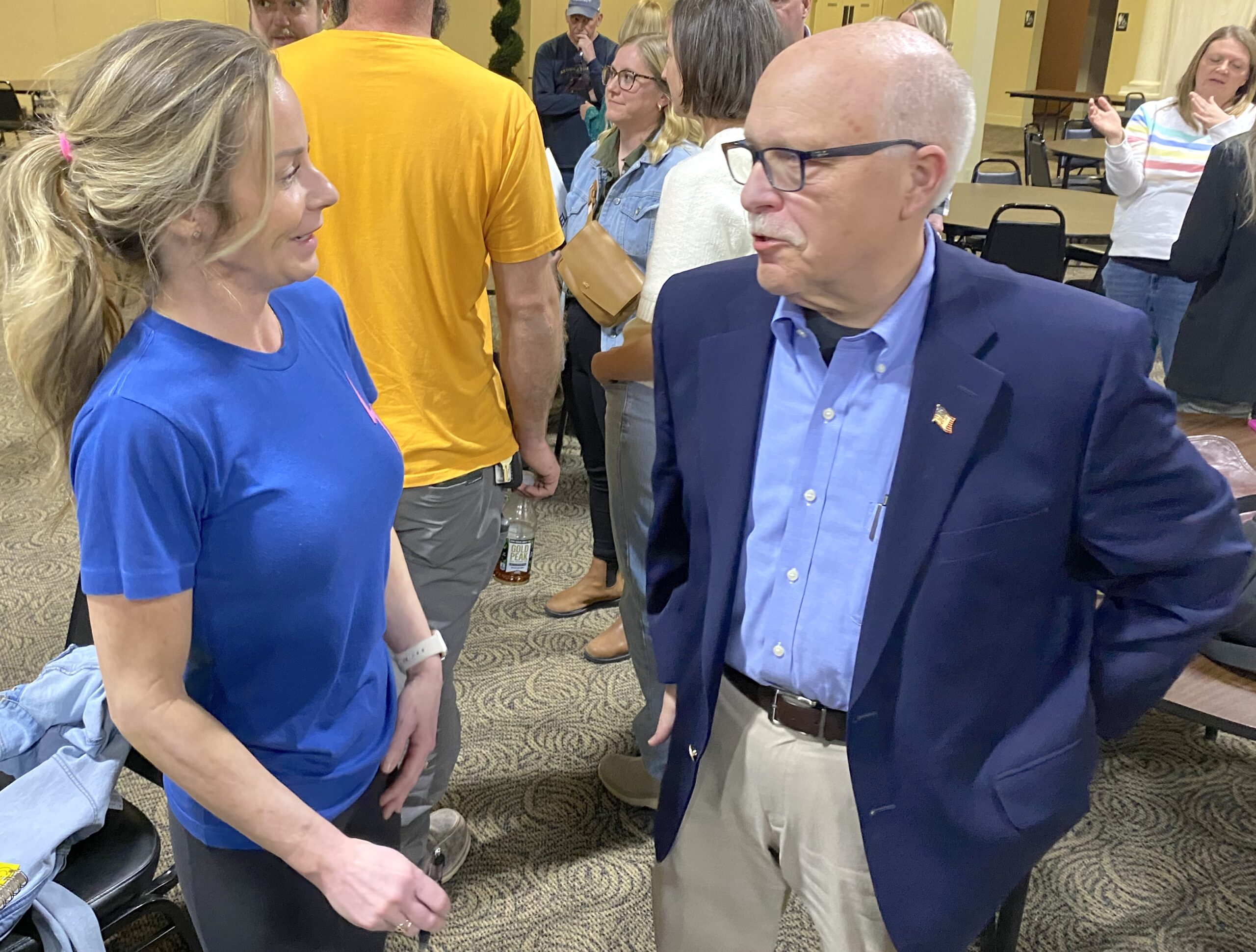Gough: Low voter turnout in Tuesday’s consolidated election … apathy or something else?

Republican Mike Troup survived a tough primary four years ago to win his first term as mayor over Democrat Nora Baldner by a 61-39 percent margin, with 8,145 votes cast.
After surviving a tough Republican primary against Dan Brink in February, Troup lost his re-election bid on Tuesday to Linda Moore, who ran as an independent, by a 58-42 percent margin with 7,071 votes cast.
The Cook Partisan Voting Index (PVI) is a measurement of how partisan a region is and how it leans toward either the Republican or Democratic party compared to the nation as a whole, based on the vote of the last two presidential elections.
Adams County is roughly a plus-20 Republican county, That means a Republican should have a significant advantage in most races. While that was true in 2021, it was not the case in 2025 as Moore beat Troup by 1,189 votes.
Consecutive Republican primaries for mayor can cause hard feelings. While most Republicans coalesced behind Troup four years ago, far fewer of them came home on Tuesday.
When Troup defeated Paul Havermale by 26 votes in 2021, Havermale’s coalition included members of the Quincy Tea Party as well as some conservative Democrats who believed the candidates in that primary (Nora Baldner and Brennan Hills) were too liberal for their tastes.
Troup had the Tea Party in his corner this time for the February primary, but those Dan Brink supporters (which were many of the Havermale supporters from 2021) didn’t seem to come along for the consolidated election. Possibly because of the Troup’s campaign’s attacks on Brink regarding his tenure on the Illinois Prisoner Review Board and being appointed to the post by Adams County’s favorite governor, JB Pritzker.
Also, no Democratic primary was held this time around.
There were 3,584 votes cast in February’s Republican primary, with Troup getting 1,771 votes and Brink garnering 1,633. Troup received 2,941 votes Tuesday, meaning that from the primary to the consolidated election, he picked up 1,170 votes. If everyone who voted in the primary voted in the consolidated election on Tuesday, 643 people either stayed home or voted for Moore.
Another way to look at it? People who didn’t vote for Troup in the primary cast 5,424 votes Tuesday. He only picked up 21.5 percent of those votes.
What changed to make Troup the first one-term incumbent to lose a Quincy mayor’s race in nearly 100 years? (Remember: Leo Lenane, Wes Olson and John Spring all were incumbents who lost, but they all served two terms before losing.)
Before the deep dive into Team Troup, the Moore campaign should receive credit for a strong effort. They took the slings and arrows, didn’t return fire and stayed on message (potholes anyone?). Their social media presence was dominant, engaged and positive.
While the Troup campaign made a hard charge at the end with numerous mailers and knocking on about 3,000 doors in the final weekend, that effort didn’t outweigh some self-inflicted wounds down the stretch.
The failed attempt to rezone a nearly 18-acre piece of land northeast of Rooney Elementary School on Columbus Road for a proposed multi-phase, multi-family residential development may have been a factor.
After the City Council voted against the rezoning, Troup acknowledged residents’ concerns for increased traffic, especially with the already-approved construction of a separate 100-unit complex nearby.
“When you look at three units of 90, so you get to 270 more units, they’re like, ‘Whoa.’ It could be overkill for that area,” he said after March 17 meeting.
However, when the Plan Commission voted Feb. 25 to approve the proposal and send the rezoning issue to the City Council, Troup was quick to tell supporters celebrating at Tower of Pizza after his primary victory that same night that the proposed complex would be “just beautiful” and that it would “put a dent into what we need for apartments for working-class people.”
Troup then called an afternoon press conference on Feb. 26 — likely because so few media covered the Plan Commission meeting on the night of a primary election — to tout the proposed project again.
However, residents living near the proposed complex met twice with city offcials. The second meeting on March 13 attracted approximately 300 people.
One of the biggest complaints is that residents felt too few people were informed of the proposal. City code establishes a 250-foot radius around a property, and anyone living within that radius has to be notified. Jason Parrott, director of planning and development, told the crowd that “12 or 13” people were notified. He also said a sign informing the public that a zoning change had been requested was posted at the site, but many people in attendance — including one woman who said she lived directly across the street — said they never saw it.
When those in attendance were asked to stand if they were against the project, nearly everyone stood.
“Guys, please remember there is an election coming up,” Rachel Doerhoff, one of the meeting coordinators, told the crowd that night.
Did it make a difference? Many of the people whose properties on Columbus Road would have been affected could not vote in the election because they live outside of the city limits (the proposal called for annexing the property had the City Council approved it). However, voters in Precincts 18 and 15 — the closest precincts to the proposed multi-family residential development — voted for Moore 308-239. They are in the 3rd Ward, which has two Republican aldermen, and the Republican candidate should’ve carried them by 200 votes combined.
Troup was banking on a retail and development boost to bolster his case for re-election. Many projects have arrived or are on the way, but the numbers haven’t yet shown much of an increase.
The sales tax revenues for December 2024 were $1,248,826. Those revenues were $1,247,803.71 in December 2023. That’s only a $1,000 increase from a year ago in an apples-to-apples comparison.
Home Rule Sales Tax numbers didn’t show that much more growth, going from $1,232,698 in December 2023 to $1,241,156 in December 2024, an increase of $8,458.
It’s worth noting that December 2023 was the first December after Target opened in Quincy. The December 2022 sales tax revenue numbers (pre-Target) were $1,173,257, so while maybe there was a bit of a Target bump, that rate of growth has not yet held up.
If you’re banking on sales tax growth to drive city revenues and support expenses, it’s going to have to grow much more and much faster.
Also, many of the projects Troup (and his supporters) touted were team efforts that included assistance from other organizations, including the Great River Economic Development Foundation and Adams County, who failed to receive much acknowledgement by the Troup campaign. That rankled some of the partners who might had have otherwise offered stronger support or endorsements.
While there is no “I” in team (but there’s an “m” and an “e”), when you are the mayor, you probably should try to take the credit because, if it falls through, you’re going to get the blame.
How low was the record low turnout? Every mayoral election but one from 1917 to 2013 garnered more than 10,000 votes. The three lowest vote totals since 1917 were:
- 9,721 — R-David Nuessen (7,817 votes) def. D-Kenneth Bickhaus (1,904) in 1981
- 8,688 — R-Kyle Moore (4,484 votes) def. I-Jeff VanCamp (4,204) in 2017
- 8,145 — R-Mike Troup (4,954 votes) def. D-Nora Baldner (3,179) in 2021
Tuesday’s vote total was more than 13 percent worse than the lowest vote total in city history.
The tone of the Troup campaign also may have turned off a few people.
Moore’s campaigning faux pas that involved Quincy University was overblown and fueled by Troup supporters with QU ties who basically threatened to report the school to the NCAA if QU President Brian McGee didn’t go public with it.
One QU official told MRN before the election they believed the QU kerfuffle “completely backfired” and “severely damaged” the mayor’s re-election efforts.
Moore’s conversion from Democrat to an independent also was ripe for the social media commenters — and, yes, it was certainly fair game. But again, team Troup attacked the move ferociously. If you have your base well in hand, shouldn’t you be courting the Democrats and independents?
Oh, I know … that is seen as capitulation and being a RINO. Those who see it that way also don’t grasp the concept that it first requires getting elected before you can govern.
Then again, that also mirrors the opinion of many who don’t want to see government work … at all.

Miss Clipping Out Stories to Save for Later?
Click the Purchase Story button below to order a print of this story. We will print it for you on matte photo paper to keep forever.

